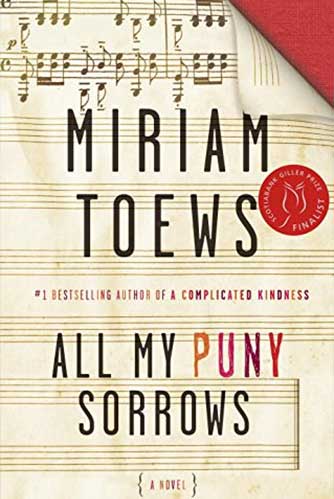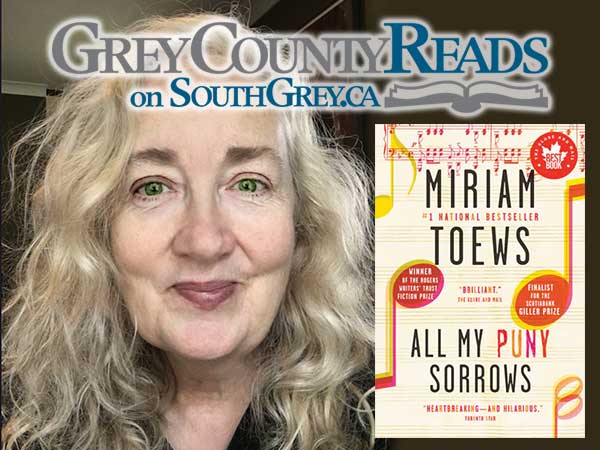
All My Puny Sorrows
By Miriam Toews
Publisher's Notes
Elf and Yoli are two smart, loving sisters leading very different lives. Elfreida is a renowned pianist, wealthy, and happily married. Her younger sister Yolandi is a writer, divorced, broke, and forever chasing after the wrong men in her search for true love. But Elf is struggling with her demons, and Yoli doesn't know what to do. Elf wants to die and wants Yoli to help her. Yoli desperately wants her sister to live. Three weeks before her highly-anticipated international tour, Elf lands in the hospital after her latest suicide attempt. There's doubt that she will be well in time, but Elf doesn't seem to care. As the bounds of the sisters' love for each other are tested, Yoli faces a decision that will forever change her life —and Elf's.
A multi-award-winning, critically acclaimed masterpiece, All My Puny Sorrows shows Toews at the height of her craft, making you smile while she breaks your heart.

The Reader/Champion
Kimberley Love will read All My Puny Sorrows by Miriam Toews. Kimberley is is an experienced marketing and communications professional and a veteran candidate for the Liberal Party of Canada. She will represent Owen Sound.
Introduction
Originally published in 2014, this novel has seen a recent revival with the release of the film adaptation starring Canadian actors Alison Pill and Sarah Gadon as the two sisters at the centre of this story. Grappling in their own ways with the death of their father by suicide many years ago, and with the shared experience of childhood, the two sisters have an unbreakable bond. We learn early about the rigidly conservative community in which they were raised, and the rebellious nature of the sisters — especially the older sister, Elfrieda, who emblazoned her own motto “AMPS” (all my puny sorrows) secretly around the village. We also learn that Elf has attempted suicide — bringing her loved ones together to a Winnipeg hospital.
The novel explores the nature and limits of love, the reverberating fallout of generational family trauma, the construction of identity, the nature of sorrow, and the meaning of life. For all the heavy themes — and there are more — the book is strangely joyful and at times, very funny. The story is told entirely from the perspective of the younger sister, using conversation and internal dialogue and reflection. Interestingly, Toews ditches the conventional punctuation around the dialogue: creating clean pages of rapid-fire dialogue that blurs between real and imagined conversation, but does a good job of replicating the natural rhythm and contradictions of our own thoughts and actions (I threw the phone in the river. I didn’t throw the phone in the river).
Plot summary
Two free-spirited sisters — Elfrieda and Yolandi — are raised in a very traditional and conservative Mennonite town in Manitoba by more liberal-minded parents who defy the local authorities to support the ambitions of Elfrieda, who becomes a brilliant, successful concert pianist with a glittering career and the security of a devoted husband, a beautiful home, and personal wealth. In an echo of their father’s violent suicide (he quietly stepped in front of a train one day), and in spite of her prodigious gifts and enchanted life, Elf is determined to kill herself. As Elf variously overdoses on painkillers, or slashes her wrists and drinks bleach, her younger sister Yolandi drops everything in Toronto to fly to Winnipeg to be with her sister in hospital. Yoli has a spectacularly messy and complicated life. She has two almost-grown children by two different fathers, is a struggling writer living in near poverty, and is navigating a divorce over the course of the novel. Yoli can’t decide if loving her sister means she must keep her alive at all costs… or heed Elf’s pleas to help her end her life in a Swiss clinic: compassionately and not alone. "She wanted to die and I wanted her to live and we were enemies who loved each other." At one point, Yoli’s to-do list includes getting the car door fixed, picking up a shower curtain, signing her divorce papers and researching how to kill her sister. Their mother Lottie is both an optimist and a fatalist, and there are many references to the resilience of the girls’ Russian grandfather, who survived the pogroms by literally hiding in a pile of manure.
Author Toews acknowledges that the book is loosely based on the 2010 suicide of her own sister. Likewise, her father — like the fictional dad — killed himself by stepping in front of a train. The novel has countless literary allusions, including the title: drawn from a poem by Coleridge about the death of his sister. Toews has also spoken publicly about the deficiencies in mental health supports (“If you have to end up in the hospital, try to focus all your pain in your heart rather than your head”, Yoli says after observing differences in medical care) and she also concedes that the novel is 'political' in its advocacy for assisted suicide in some mental health cases.
Character analysis
Yolandi - or Yoli - is the novel’s narrator, and the younger of the two sisters. They shared a childhood in a Mennonite community which was aghast that the Von Reisens purchased a piano for their older daughter Elfrieda, who had shown an interest. Yoli idolizes her older sister, and remembers her childhood as happy and carefree, in spite of the disapproval of some community members who look askance at the freethinking family. Yoli is a middling author of young adult fiction about rodeos, but is working on a “real” book: the manuscript for which she carries in a plastic bag throughout the novel, but which she won’t talk about. Yoli makes questionable relationship decisions, tries to be a competent mother to a precocious teenage daughter, and fumbles her way through everyday crises while she tries to get clarity on how to help her sister.
Elfrieda provides the centre of the story, which becomes an examination of her sorrow: the roots in generational trauma of her Russian ancestors, the reason she carries the grief of her father’s death differently than her sister, and a reframing of depression in someone who seems to enjoy a wildly privileged and enchanted life. Elf describes having a “glass piano” inside herself, which she is terrified will break and kill her. Her family and loved ones - including her husband Nic and her agent Claudio - believe that Elf’s return to the piano will help her “get over” her depression and give her something to look forward to. But a violinist named Radek has heard her play and describes the devastating sadness and sorrow that Elf communicates through her piano-playing. It was painful, uncomfortable and almost voyeuristic to be exposed to Elf’s sorrow as a member of the audience, who he felt were almost complicit. Elf desperately wants to die, but does not want to die alone. She wants Yoli to take her to Switzerland, and to be with her for a peaceful death of her own choosing. She knows her mother and husband would never help her. She hopes that Yoli will.
Theme analysis
The novel is a brilliant examination of issues around euthanasia, mental health, grief, depression, and the reverberations experienced across families and through generations. Toews grew up in a conservative rural community, and while there are many differences between her fictionalized East Village and the towns and villages of Grey-Bruce, most readers will also find similarities.
Relevance
Sometimes, novels will take us on a journey to places we’ve never been, among people that exist only in our imagination. I love those kinds of journeys. “There is no frigate like a book”, as Emily Dickinson says. But Toews keeps us closer to home, and shows our own experiences with fresh perspective. I chose the book partly because I am mourning the loss of a sister, and no one writes about sisters better than Toews. As we try — repeatedly — to emerge from a pandemic where we’ve been held at a distance from people we love, from communities that provide us with purpose and society, and where we’ve been unable to either mourn or celebrate the lives lost — in any conventional way — we are in a great position to re-examine the meaning of family, of love, of grief, of depression. We are at a moment in history where we are actually crafting legislation designed to help people choose a better path to death. Yoli worries she would regret helping her sister die. But at the end of the novel, it is clear that she regrets not doing enough. For anyone who has seen depression up close, this story is illuminating, cathartic, and oddly comforting. “I used to wake up in the morning singing”, Yoli recalls.
Summary
What a gift it would be if we all came away from the collective trauma of a global pandemic with a better understanding of the human condition, and greater compassion and tenderness for those who are struggling with mental health issues. It’s a brilliant book: beautiful, profound, and suffused with wry wit. This is the book to read in 2023.





